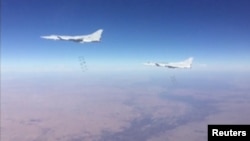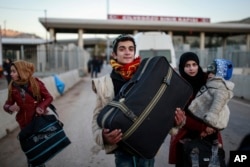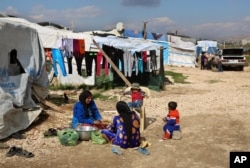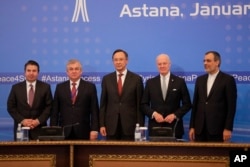Turkey says it is too early to comment on U.S. President Donald Trump's plan to establish safe zones in Syria.
Turkish Foreign Ministry spokesman Huseyin Muftuoglu says it will be important to first see the results of studies that Trump is expected to order from the Pentagon and State Department about instituting zones where civilians in Syria could be safe from the country's ongoing conflict.
The Pentagon also said it would not comment on "drafts" and "pre-decisional" plans.
"Our focus in Syria is what it has always been, which is the degrading and defeating of ISIS and that has not changed," Pentagon spokesman Jeff Davis said Thursday.
Turkey, which shares a border with Syria, has long advocated safe zones. Former U.S. President Barack Obama did not support the idea.
In Russia, presidential spokesman Dmitry Peskov said the Russian government has not been consulted by Trump's administration. He added that all of the potential consequences of a no-fly zone need to measured first, and that "it is important not to exacerbate the situation with refugees."
Humanitarian crisis
The nearly six-year-old war in Syria sparked a huge humanitarian crisis in the region with nearly five million Syrian refugees currently living in neighboring countries, while many others have gone to Europe. Many places in those host nations have struggled to provide services and have dealt with sharp public debates about whether to let people fleeing violence and instability into their country.
Earlier this week, Turkey and Russia, along with Iran, brought delegates from the Syrian government and rebel groups to Kazakhstan for a round of peace talks that ended with the three nations agreeing to help monitor a partial cease-fire and work toward a political resolution to the conflict.
Turkey spokesman Muftuoglu said Thursday his country will not allow certain fighters to spoil the cease-fire, which went into effect in late December. He also reiterated Turkey's position that Syrian President Bashar al-Assad has no place in Syria's future. Turkey has backed the rebels throughout the conflict that began in 2011 as peaceful protests before spiraling into a civil war.
Britain's foreign minister Boris Johnson said Thursday Assad could be allowed to run for re-election as part of a "democratic resolution", marking a dramatic shift in the country's view of the conflict.
"We were wedded for a long time to the mantra that Assad must go. We haven't at any stage been able to make that happen," Boris Johnson told members of a parliamentary committee in the House of Lords.
Assad's fate has been a point of disagreement during multiple international efforts to achieve peace in Syria. The U.N. has created a framework that calls for a new constitution and new elections. Assad's allies, which include Russia and Iran, have said he should stay in power.
The next peace talks are scheduled to take place February 8 in Geneva.
VOA's Carla Babb contributed to this report
















